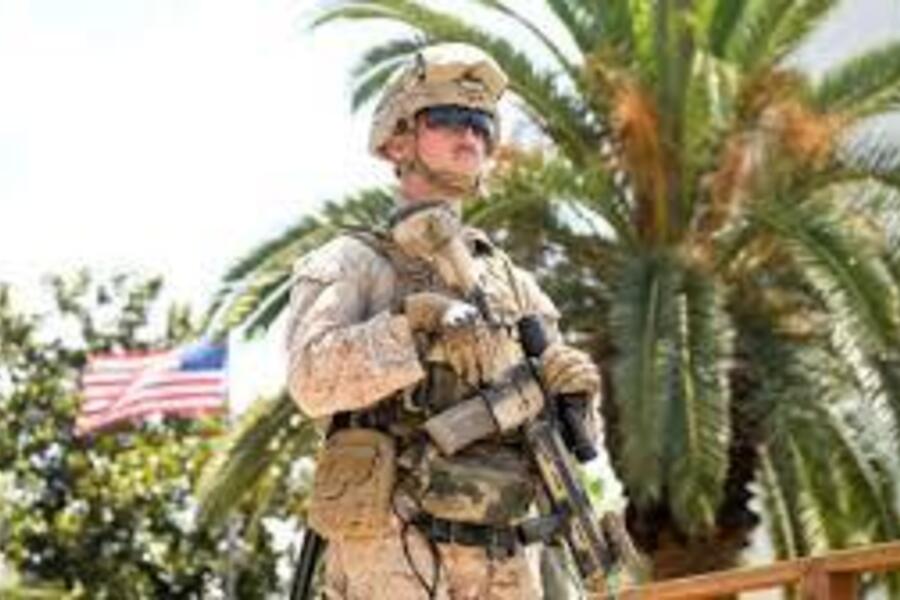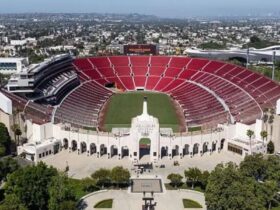In a rare and symbolic episode underscoring the intensifying role of U.S. military forces in domestic operations, a group of U.S. Marines briefly detained a civilian outside a federal building in Los Angeles on Friday, just hours after their deployment began in the city.
The incident involved Marcos Leao, a former Army combat engineer, who was stopped by Marines after he inadvertently crossed a caution tape boundary while rushing to a Veterans Affairs appointment. According to Leao, he was wearing headphones and didn’t hear the Marines’ initial commands to stop. He complied once he noticed them running toward him.
“They told me to get down on the ground. I complied with everything they were saying,” Leao recounted.
He was restrained with zip ties and held for more than two hours by Marines and members of the National Guard before being released without charges. The Los Angeles Police Department (LAPD) confirmed they responded to the incident but found no grounds for arrest.
Leao’s temporary detention marks the first known instance of federal troops detaining a civilian in Los Angeles following President Donald Trump’s controversial decision to deploy active-duty military forces to cities across the country in response to ongoing protests against immigration enforcement.
The federal presence includes approximately 700 U.S. Marines, of which around 200 arrived in Los Angeles Friday, augmenting 2,000 National Guard members already stationed outside key government buildings. An additional 2,000 Guard troops were placed on standby earlier this week.
While the Marines’ authority to temporarily detain civilians under specific conditions was confirmed by a U.S. Army North spokesperson, the act has reignited concerns over the boundaries of military involvement in civilian law enforcement. According to the military, detentions by service members must end when the individual can be transferred to civilian law enforcement authorities.
“I didn’t know it was going to be this intense here,” Leao said, expressing surprise at the heavy military presence.
Critics argue that such actions blur the lines established by the Posse Comitatus Act, a federal law that restricts the use of the U.S. military in domestic law enforcement roles. Legal scholars and military professionals warn that these actions may set a troubling precedent.
“This is an inevitable precursor of things yet to come when you put troops with guns right next to civilians,” said Gary Solis, a former Marine Corps prosecutor and military judge. “It’s part of Trump’s broader attempt to unravel the Posse Comitatus Act.”
The deployment of U.S. Marines and National Guard units has been met with both political scrutiny and public unease. To mitigate risk, the Pentagon issued training in de-escalation, crowd control, and clearly defined rules for the use of force, anticipating potential confrontations with protestors or civilians in tense environments.
Nevertheless, Friday’s encounter exemplifies the inherent volatility of placing combat-trained troops in direct proximity to American civilians, especially amid a politically charged crackdown on immigration.
An unnamed U.S. official told the Associated Press that Leao was warned not to cross a restricted area and was taken down after ignoring verbal commands — a scenario that many fear could repeat itself under similar conditions.
This incident raises urgent questions about the balance between national security and civil liberties, especially as the federal government continues to rely on military resources for domestic operations. With immigration enforcement becoming a central policy battleground, the optics and legalities of military personnel detaining civilians are bound to spark further debate.
As more troops arrive and enforcement escalates, lawmakers, legal experts, and advocacy groups are expected to weigh in on the constitutional implications and whether the boundaries of military engagement on U.S. soil are being quietly redrawn.
The Pentagon’s role in supporting domestic operations will likely come under increased scrutiny in the weeks ahead. Civil rights organizations are expected to challenge any signs of mission creep or overreach in court. Meanwhile, local authorities, including the APD, will need to coordinate carefully with federal forces to avoid confusion and unnecessary detentions.
Leao’s experience, while brief and non-violent, serves as a flashpoint in the larger national conversation about immigration, federal authority, and the militarization of public space.





Leave a Reply